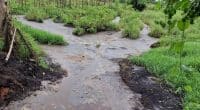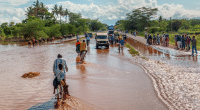The 4th edition of Future In Africa (FIA) closes on 26 October 2023 in Casablanca, Morocco, under the theme "Digital 4 Water: Digital for better water management". Digital technology could enable every African country, including Morocco, to improve its water management.
At the Future In Africa 2023 (FIA) conference in Casablanca, Morocco, the participants were unanimous. Improving the efficiency of water supply systems will require digital technology. “Digital innovation is an inexhaustible resource that can be used to develop exhaustible resources such as water”, said Sarah Lamrani, Secretary General of the Moroccan Ministry of Digital Transition and Administrative Reform, at the first AIF round table on the role of digital technology in water management. Intelligent management of the resource would make it possible, for example, to measure the quality and quantity of water in a geographical area, as well as the state of equipment, to collect data to help plan water projects, to rationalise the use of this resource, which is being drastically reduced in Africa due to drought, etc.
In 2021, for example, the Senegalese National Water Company (SONES) has recruited Yokogawa Solution Service Corporation, a subsidiary of Yokogawa Electric Corporation, a Japanese supplier of digital technologies, and Toyota Tsusho Corporation of the Toyota group, to install monitoring systems on the drinking water distribution network in Dakar, at around 200 locations. The aim is to locate water leaks in the Senegalese capital due to outdated or faulty installations.
While similar initiatives have been taken by several other countries, also for irrigation water management, they represent a tiny fraction of the opportunities offered by digital technology for this sector. It has to be said that digital technology remains an equation to be solved in Africa.
Digital laboratories for innovation…
There are many digital challenges, including speed, traceability, connectivity to data processing centres and eco-responsibility, but Moroccan experts in the water sector believe it is possible to meet them.
Firstly, by setting up digital laboratories to encourage start-ups and other high-tech companies to innovate in response to use-cases (real demands). “We could very well imagine a digital laboratory in which the Moroccan Ministry of Digital Transition and Administrative Reform works with the regions that are highlighting their problems, in order to reflect together on optimal solutions. These solutions could, for example, help to better capture water data and optimise farming operations. In Morocco, we are in the process of doing this for other sectors, and we said to ourselves, why not also create digital laboratories for the water sector”, explains Sarah Lamrani, Secretary General at the Moroccan Ministry of Transition.
Above all, this approach would help to focus intelligence on proactive innovation. It is also up to African start-ups to tackle the problems in each sector and come up with appropriate solutions. But first, all the use-cases need to be connected.
Then we need to support these start-ups so that they are in a better position to innovate, in particular with funding and training in digital needs. More importantly, they will need to have access to the market, and this will be possible by clearly defining these “use-cases”.
Implementing cross-functional strategies
In addition to digital laboratories and support for innovation by start-ups, the players in the water sector present at Future In Africa 2023 are recommending that cross-sector strategies be put in place to optimise the contribution of digital technology to water management in Africa.
According to Mehdi Kettani, Chairman of the Maroc Numeric Cluster, which is co-organising the 4th Future In Africa 2023 with the Casablanca-Settat region, the Kingdom of Morocco needs to develop an ecosystem of projects that are better connected to the international market in order to address it more effectively.
Read Also – Michael Kögeler: « Digital enables sustainable and efficient water management
These strategies should also contribute to the convergence of public policies, the coordination of digital data to help plan projects in the water sector, and the regulation of water use. On this last point, it has been suggested that all water installations should be fitted with digital devices. These devices will make it possible to measure the quality and quantity of the water in a facility, so that it can be better managed.
Inès Magoum







